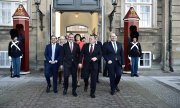Change of government in Denmark
As of Monday Denmark has a new centre-right government. A coalition made up of the Liberal Party, the Liberal Alliance and the Conservative People's Party has taken over from the minority government of the Liberal Party which had ruled the country up to then. The Danish media are scathingly critical of Prime Minister Løkke Rasmussen's plans.
Rasmussen must now rely on the right
The fact that the new government will depend on support from the right-wing Danish People's Party (DF) could lead to considerable problems, Nordschleswiger writes:
“DF leader Kristian Thulesen Dahl gave the new government a foretaste of this dependence when he made fun of it by pointing to a 0.3 percent increase in public sector [spending] even though all three ruling parties had opposed even a zero percent increase in the budget purely in terms of figures. The government will have to reward Thulesen with an even harsher line in foreign policy in exchange for concessions in other areas. The question is whether the DF is willing to make drastic cuts if it wants to play the role of the social conscience in the welfare state. 0.3 percent is an initial offer, but it won't be enough if the government wants to avoid subjecting the country to social hardship.”
Women relegated to unimportant posts
The number of ministers in the new Danish government has risen from 18 to 22. For Jyllands-Posten this is an all too obvious manoeuvre:
“Let's be honest, was anyone yearning for a 'Ministry for Equality and Nordic Cooperation' or a special 'Ministry for Seniors'? One might be forgiven for thinking that this was not just about fulfilling the parties' wishes, and that they also wanted to create a couple of extra ministerial posts simply to have enough women in government. Now the tally is 13 men to 9 women, but all the economic posts as well as the foreign and security portfolios are in the hands of men. And the members of the five key government committees, including the important coordination committee, the economic committee and the security committee, are all men.”

